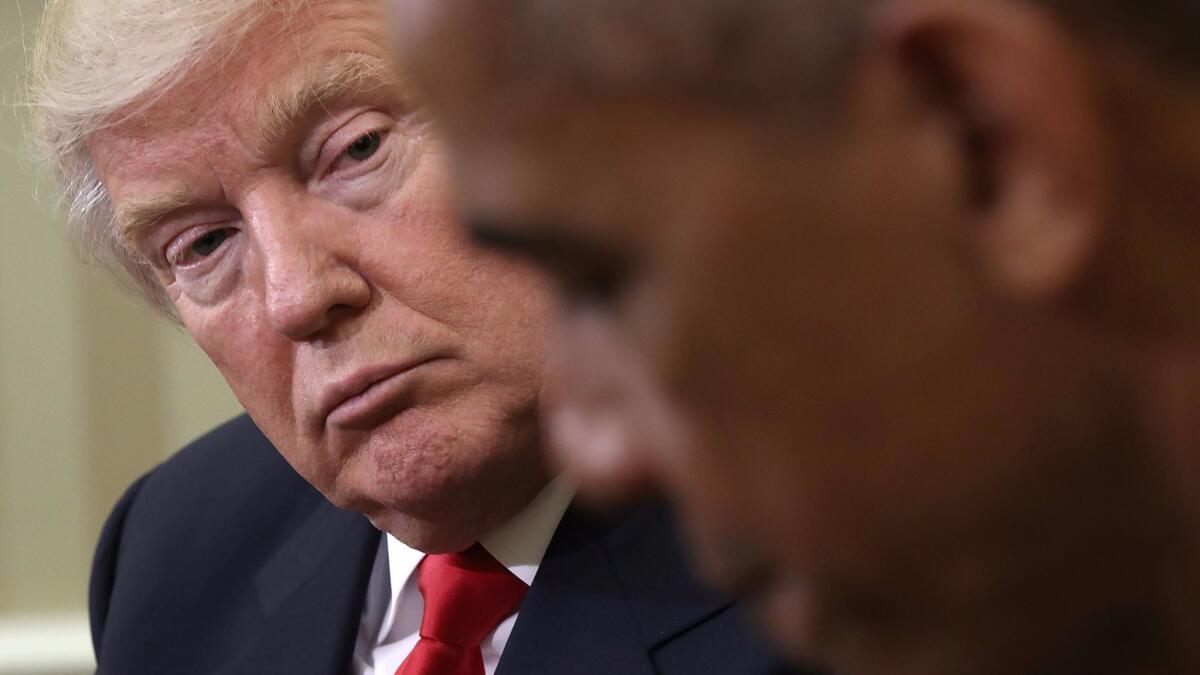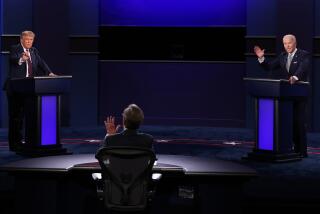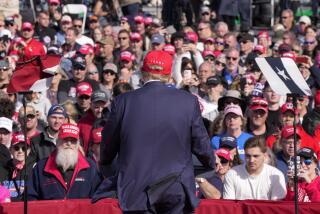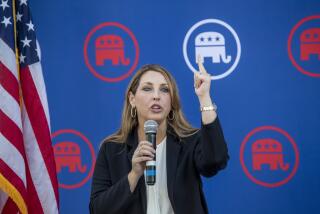Trump’s election lies are part of a much broader strategy. Here’s how it works

President Trump’s ludicrous assertion that massive voting fraud robbed him of victory in last month’s election has been rejected by officials of both parties in dozens of states, ignored by foreign leaders around the world and debunked by elections experts who have declared the race over.
On Tuesday, even Trump’s own attorney general, longtime loyalist Bill Barr, acknowledged that the Department of Justice has not found any fraud that could have changed the outcome of the election.
Yet Trump persists, declaring noisily and repeatedly to all who will listen that the election was stolen by corrupt Democrats. Almost a month after the polls closed, he’s still insisting that the voting discrepancies were “tremendous,” the election “rigged,” the voting machines “fixed” and that there were “dead people voting all over the place.”
Some view this as self-delusion, the inability of a narcissist to face up to his own defeat. But that’s too generous. In fact, it is deception plain and simple, the logical culmination of Trump’s grand, four-year-long assault on the truth. Baselessly undermining the integrity of the election — the most elemental symbol of American democracy — is merely a fitting finale to his dishonest presidency.
This final big lie is classic Trump. He offers no facts or evidence. It’s just his word against everybody else’s. And that’s the heart of the strategy.
From the moment he took office, Trump has used his powerful platform — and the outsized megaphone that goes with the presidency — to create an alternative reality in which his truth is as good as anyone else’s truth, even if it isn’t exactly, well, true. The idea was that if he cast doubt on information put forth by society’s traditional arbiters — the scientists, the experts, the judges, the journalists — it would leave ordinary Americans rudderless and uncertain what to believe. If every “expert” who disagreed with him was a liar, as well as a partisan or an enemy of the people or a member of a vast conspiracy, then their facts posed no challenge to his “facts.” Americans would have to decide what to believe based on who screamed the loudest and who was saying what they wanted to hear.
That’s been the playbook for four years. As of mid-September, the Washington Post had counted more than 23,000 false or misleading claims made by the president. Many of them were delivered directly to supporters over Twitter, where he has 80 million followers.
According to CBS correspondent Lesley Stahl, Trump explained to her in 2016 — off camera, of course — why he attacked the press so regularly. “I do it to discredit you all and demean you all, so that when you write negative stories about me, no one will believe you.”
Well, that’s pretty straightforward.
Trump is not the first world leader to seek to invent his own version of the truth. Consider the descriptions below by two of the great political thinkers of the mid-20th century.
First, novelist and critic George Orwell, writing in 1943 about how fascist propaganda “often gives me the feeling that the very concept of objective truth is fading out of the world.”
“In the past, people deliberately lied, or they unconsciously colored what they wrote, or they struggled after the truth, well knowing that they must make many mistakes; but in each case they believed that ‘facts’ existed and were more or less discoverable. ... It is just this common basis of agreement, with its implication that human beings are all one species of animals, that totalitarianism destroys. Nazi theory indeed specifically denies that such a thing as ‘the truth’ exists. There is, for instance, no such thing as “Science.’ There is only ‘German Science,’ ‘Jewish Science,’ etc. ... If the leader says of such and such an event, ‘It never happened’ — well, it never happened. If he says that two and two are five — well, two and two are five.’”
Second, political philosopher Hannah Arendt writing in her 1951 book “The Origins of Totalitarianism” about how the lies are received:
“In an ever-changing, incomprehensible world, the masses had reached the point where they would, at the same time, believe everything and nothing, think that everything was possible and that nothing was true. ... Mass propaganda discovered that its audience was ready at all times to believe the worst, no matter how absurd, and did not particularly object to being deceived because it held every statement to be a lie anyhow. [Totalitarian leaders found] one could make people believe the most fantastic statements one day, and trust that if the next date they were given irrefutable proof of their falsehood, they would take refuge in cynicism.”
Obviously, Trump is not Hitler or Stalin or Franco. But his techniques are familiar.
Polls say his election fraud narrative already is working. A Politico/Morning Consult survey taken after Biden’s victory found that 70% of Republicans don’t believe the election was free and fair.
Perhaps Trump’s goal, as many have speculated, is to retain his place in the political firmament, and perhaps even to run again in 2024 — and to do so by nourishing the fantasy that Republican voters were robbed of the presidency by corrupt Democrats.
But can Americans really be that gullible? Will tens of millions of voters really toss their critical faculties aside and jump on Trump’s grievance-and-resentment train?
In a healthier world, they would not simply take his word for it, but would ask themselves the kinds of questions one usually asks to determine what is true: What does common sense say? What do the experts say? What is the simplest, least conspiratorial explanation? Is anyone who would be expected on ideological grounds to say one thing in fact saying the other?
A modicum of honest, open-minded thought would go a long way toward defusing this volatile situation.
More to Read
A cure for the common opinion
Get thought-provoking perspectives with our weekly newsletter.
You may occasionally receive promotional content from the Los Angeles Times.







